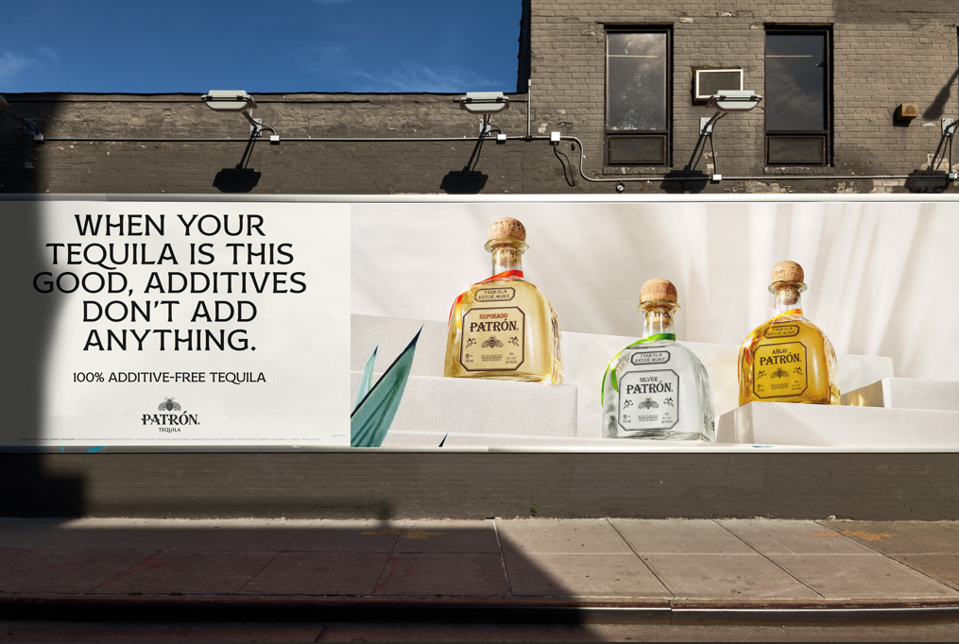Patrón says it is continuing to have a “construction conversation” with Mexican authorities after a dispute over the tequila brand’s additive-free marketing campaign. It is also sticking to the themes of that ad blitz, albeit with one key concession.
For four days in February, the Bacardi-owned tequila maker says its export certificate was revoked by the Tequila Regulatory Council, or CRT, which oversees the tequila industry and verifies that all production adheres to the Mexican government’s regulations. Patrón says that the CRT’s decision was a direct response to an additive-free ad campaign the brand debuted earlier this year.
“While the CRT does have authority over the standards applicable to tequila, the organization does not have authority to regulate marketing/advertising of tequila in the U.S. based on the express terms of the agreement between the U.S. and Mexico on trade in tequila,” says Patrón in an email statement to me.
What Is Additive-Free Tequila?
Patrón’s “100% Additive-Free Tequila” campaign kicked off in February and included outdoor ads in markets including Los Angeles and New York City and messaging that appeared on Patrón’s website and social media channels. Additive-free tequilas are alcoholic beverages that are made using only three ingredients—100% Weber Blue Agave, water and yeast.
Patrón says consumers want to know what’s in their drinks, even though alcoholic beverage brands aren’t legally required to add an ingredient list to their labels. As proof, the brand cites a Bacardi consumer survey that shows 61% of consumers globally say they would pick additive-free spirits over alternatives that have those ingredients.
“At Patron, we think that the more transparency within the industry, the better,” says Ned Duggan, global chief marketing officer of Patrón, tells me during a virtual interview. “It’s what bartenders and tequila drinkers are asking for, and we think it’s what they deserve.”
Sounds simple enough, but additive-free tequila has caused a stir in Mexico and elsewhere. Additives—which can include sweeteners like aspartame, oak extract and caramel coloring—are permitted if less than 1% of the weight of the tequila, without any requirement of disclosure, according to the standards set by the CRT.
Craft tequila brands were among the loudest proponents of additive-free tequila, though it hasn’t always been clear how many were rigorously and consistently testing to ensure their batches were free of any additives. That’s especially challenging for many smaller players that contract distill, a common industry practice that allows spirits brands to outsource production to outside distilleries. Other leaders in the space, like Jose Cuervo, which uses additives in some products, say the entire conversation has been “damaging” to the category because these ingredients are legally allowed and aren’t harmful to drinkers.
At Patrón, Duggan says the brand is seeing sturdy interest in additive-free tequilas at bars and restaurants and also in liquor stores, where some retailers are even carving out shelf space that specifically touts these products.
Patrón Says Export Halt Had “Impact” On Business
The four-day export halt, Duggan adds, “does have an impact on our business,” though he wouldn’t quantify how big the hit would be. Duggan also couldn’t get into specifics about ongoing conversations with the CRT.
One concession that Patrón has made to the CRT involves language on the brand’s website. Patrón removed the more overt additive-free messaging. The company still lauds the use of three, all-natural ingredients, but without any mention of additive free.
The CRT, meanwhile, has maintained that because small traces of additives are allowed in accordance with Mexican regulations, there is “no such thing” as additive free tequila, as long as it remains under that 1% threshold.
In an email to me, the CRT didn’t address why Patrón’s exports were halted for a brief period earlier this year, only saying that “there is currently no dispute” with Patrón and that the organization “does not, and has not, retaliate against any of the more than 208 authorized producers, bottlers, or the more than 43,000 agave growers registered with this organization.” The CRT went on to add that “we reiterate clearly that the CRT operates under technical, legal, and objective principles, and not based on external interests or reactions to advertising campaigns.”
Even if Patrón and the CRT aren’t exactly on the same page—at least, for now—as it relates to additive-free tequila marketing, Duggan struck an optimistic tone about the future.
“I think ultimately, there is common ground that we have with the CRT and that we both want to have a vibrant and expanding tequila industry around the world, and one that has product integrity at its core,” says Duggan.

